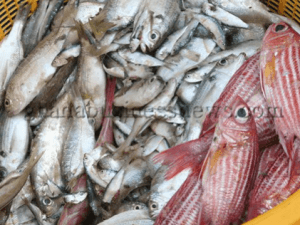African journalists network to promote sustainable fisheries
 Over 100 journalists from 44 African countries convened at Elmina, Ghana, under the auspices of the World Bank, African Union, USAID and SRFC to tackle issues in the fisheries sector and enhance their capacity for promoting sustainable fisheries.
Over 100 journalists from 44 African countries convened at Elmina, Ghana, under the auspices of the World Bank, African Union, USAID and SRFC to tackle issues in the fisheries sector and enhance their capacity for promoting sustainable fisheries.
According to a statement from the World Bank, the forum was to promote sustainable fisheries and resilient fisheries communities, and build the capacity of the journalists to network and heighten awareness of the urgency of declining fish resources through factual, accurate, and deep-dive reporting on fisheries issues.
The World Bank says fish accounts for more than half of the total animal protein consumed by the people in Africa, providing essential food security especially in countries such as Liberia and Sierra Leone as they were recovering from the Ebola outbreak.
Globally, one billion people in developing countries depend on fish for their primary source of protein, yet fish resources are being over-exploited with poor management and illegal fishing, making it hard for fishers to feed their families.
In Ghana for example, about 135,000 fishers saw a 40 per cent decline in catch in the first decade of the 21st century.
Henry Kerali, World Bank Country Director for Ghana, Liberia and Sierra Leone, was also quoted as saying: “… there are too many boats and too many fishers chasing too few fish. The consequence has been biological degradation of fish resources and substantial economic losses.”
“Globally, the economic loss from poor fisheries governance and management amounts to $50-100 billion each year. As African fisheries continue to expand, policies are needed to guide the industry to prevent further resource degradation, rehabilitate over-exploited stocks, and manage overall fishing effort levels”.
According to the statement, participants at the meeting witnessed how sustainable fisheries management could reduce extreme poverty, build climate resilient communities, and foster strong economies.
The journalists travelled to the fishing communities of Apam, Elmina, and Moree to meet with fishers, families and local officials and experience how the 40 per cent decline in fish stock had affected their lives.
The fishers discussed their daily struggle to make a living from the fisheries sector which is deeply affected by Illegal, Unreported and Unregulated (IUU) fishing in addition to tackling the use of chemicals and dynamite in the water, child labour, and gender issues.
Marieme Talla Diagne, Acting Permanent Secretary of West Africa Sub-Regional Fisheries Commission, was quoted as saying; “The promotion of transparency and participation in the fisheries sector is taking center stage globally.
“It is obvious that without a platform or an effective network to disseminate relevant information to the public, these objectives will be difficult to achieve, even with the best will of governments.”
The World Bank says though development partners have supported efforts to build sustainable fishery management and coastal resources, there was still a long way to go.
“We expect journalists to go back and support their countries’ efforts to make the fisheries sector the cornerstone of food security, livelihoods, social safety nets, and jobs,” Magda Lovei, an Environment and Natural Resources Manager of the World Bank, was quoted as saying.
Source: GNA
